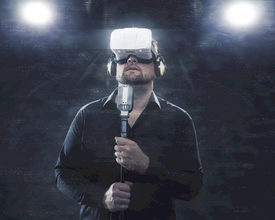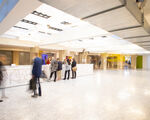A decade ago, futurists were predicting the death of the meetings industry as a result of technological advancements such as video conferencing and connected workspaces. In stark contrast to those views, we in the business events industry know there will always be an innate requirement for people to come together to share ideas and collaborate.
One of the world's leading technology and innovation events, South by South West (SXSW) Interactive, took place in Austin, Texas and key themes throughout the conference demonstrated that technology is not the enemy, but central to enhancing the quality of these meetings.
Here are just five ways in which technology is adding value to the future of the meetings industry:
1. Marketing
Augmented reality (AR) and virtual reality (VR) were hot topics at SXSW. These key growth areas will greatly improve the marketing of events on a global scale, as they help fully immerse people in an experience. We are already seeing destinations build desire and awareness about products and places through the use of these 'realities'. Business Events Sydney has a terrific Bridge Climb VR experience that it takes on the road to trade shows around the country and the world. Following the December opening of ICC Sydney, a new integrated convention, exhibition and entertainment precinct in downtown, harbour side Sydney, the market will be able to visit the venue through a new VR experience.
2. Delivery
As live hologram and other techniques improve, the vision is that international thought leaders will be able to participate in more events. Live streaming services such as Periscope, Meerkat, Facebook Live, YouTube Live and Amazon Twitch also got a lot of attention from the marketers at BMW, GE and Mashable at SXSW. These platforms will allow not only world leaders to share in key events, but other professionals and students hungry for knowledge from across the globe. By continuing to reach a wider audience, the dissemination of ideas and innovation can only increase.
3. Event management
Near field communication (NFC) is already commonplace in smartphones. By effectively utilising this technology, event organisers have the ability to track the activity and behaviour of attendees. By using this collected data and listening to what works and doesn’t work for audiences, event organisers can work at continually improving their offering and providing bespoke event solutions to ensure a strong future for the venue and their host city.
4. Security
One of the displayed innovations at SXSW was the computer 'Watchdog', who sits by your screen when you need to leave it unattended and will bark when anyone tries to touch your computer. It also sends you a notification and films the perpetrator. Alongside novel solutions for personal devices, the increased sophistication of technology can increase the safety for those attending large-scale events. Thumb print technology, which is already becoming ubiquitous and available on most smartphones, combined with iris recognition technology adds a new layer to our ability to actively and passively monitor activity during major events.
5. Increasing measurable innovation
At SXSW, Barack Obama asked the digital industry, "How can we start coming up with new platforms, new ideas and new approaches, across disciplines and across skill sets, to solve some of the real problems we're facing today?" Large scale meetings and events are the first step in enabling tech to deliver and uncover innovation and solutions. Professor Maurice Pagnucco, Deputy Dean (Education) in Engineering and Head of the School of Computer Science and Engineering at UNSW, explained that real-world competition, such as that in RoboCup, the world’s biggest annual robotics event coming to Sydney in June 2019, actively pushes advances in technologies.
"What we learn from robots playing soccer or navigating a maze can be applied to industry and help us solve difficult real-world problems. The same vision system developed by UNSW for RoboCup is now being used to track the hands of workers in a saw mill, to ensure the machinery avoids causing injuries."
This year's SXSW proved that the dial is constantly changing when it comes to advances in technology and there is little room for those who don’t jump on the tech train. The challenge for our industry is to embrace these exciting changes and opportunities these technologies bring. By utilising them to their best advantage we can enhance the delegate experience and simplify the execution of events. As audience reach increases through the digital sphere, we can also use these sophisticated platforms to provide value on a growing, international scale and ensure the future of the business events industry remains strong.








